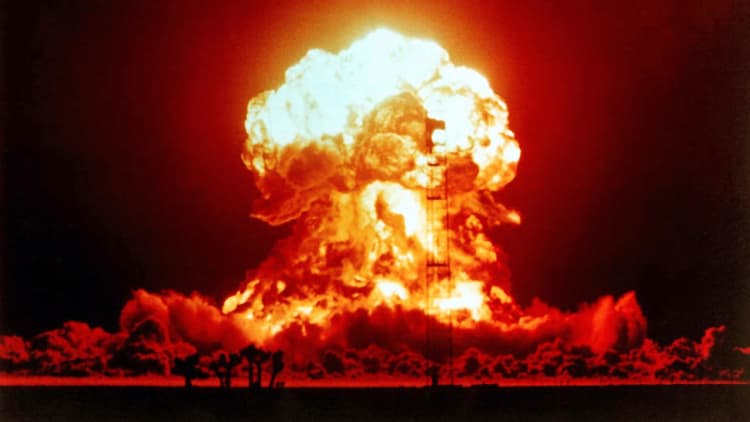
A decision by the United States to pursue a new breed of nuclear weapons could push China to reconsider its decades-long atomic policy, according to experts.
The U.S. Defense Department recently received a recommendation that the government develop tactical nuclear weapons with "low yield" results that can be deployed within smaller battlefield areas.
Tong Zhao, an associate in the Carnegie Endowment's Nuclear Policy Program based in Beijing, told CNBC Wednesday that this more flexible form of weapon would lower the threshold of nuclear use.
"This will be seen by China as evidence of U.S. contemplating first use of nuclear weapons in a future crisis and will encourage China to consider pursuing similar capabilities that may undermine the no-first-use policy," he said in an email.
China's "no-first-use policy" means Beijing only demands the capability to ensure the launch of a nuclear missile, after being hit first by an enemy nuclear strike.
U.S. President Donald Trump signed an executive order on January 27, requiring Defense Secretary James Mattis to review America's nuclear prowess.
Zhao said U.S. plans to pursue a global missile network, initiated by the Obama administration, may be viewed by China as a threat to its own small deterrent and could mean a switch to a "launch-on-warning" policy, whereby China would retaliate before enemy missiles hit land.
"The new U.S. administration seems very much devoted to developing and deploying a massive global and layered missile defense network that protects not only U.S. homeland, U.S. allies, and friends, but also U.S. bases and troops wherever they are located or deployed.
"To make sure that there would be enough Chinese nuclear weapons to survive a U.S. first strike and not be neutralized by U.S. missile defense, China may have an increasing incentive to adopt the launch-on-warning posture," he said.
Zhao said at present there is no sign that the very top Chinese leaders are changing their attitude toward nuclear capabilities, but he does detect a growing voice among low-level analysts, military scholars and media commentators calling on China to expand its arsenal.
M.Taylor Fravel, Associate Professor of Political Science in the Security Studies Program at the Massachusetts Institute of Technology, agreed that China is extremely sensitive to U.S. capabilities and will be watching the Trump administration's next moves closely.
"During the transition, he [Trump] suggested that the U.S. should expand its nuclear forces.
"If so, China may conclude that it needs to accelerate the pace of its nuclear force modernization to ensure that it can deter a first strike by a much larger U.S. force," he said by email Wednesday.
And Taylor Fravel said China may also update its weaponry to ensure it can get past any U.S. missile defense system.
But the co-author of a report on U.S.-China Strategic Stability said there is little sign of a shift in attitude from Beijing just yet.
"China's leaders have historically viewed the role of nuclear weapons as limited to deterring a nuclear attack only.
"The main concern driving China regarding its nuclear capabilities is ensuring the robustness second-strike capability, defined as being able to launch a nuclear attack after being attacked first with nuclear weapons," he said.
Taylor Fravel also said China has long been in a technological position to upgrade its weapons.
"But technology is not destiny, especially with nuclear weapons.
"That China has chosen not to build a large nuclear force despite being able to do so is more revealing about China's intentions than its possession of the capability to upgrade its nuclear weapons," he said.


